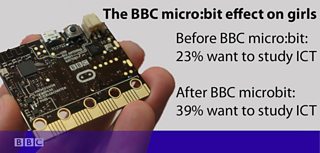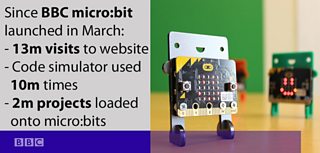Creating a legacy for the Βι¶ΉΤΌΕΔ micro:bit
Sinead Rocks
Director of Education, Βι¶ΉΤΌΕΔ
Today marks a significant milestone in the Βι¶ΉΤΌΕΔ micro:bit journey; the launch of the Micro:bit Educational Foundation. It’s a non-profit, independent organisation that will build on the work done so far with our pocket-sized codeable device and will focus efforts on continuing to encourage a generation to get creative with digital tech.
There are now around one million Βι¶ΉΤΌΕΔ micro:bits in classrooms and code clubs across the UK – manufactured & distributed by the Βι¶ΉΤΌΕΔ & partners as part of the . Our micro:bit has four different code editors, along with hundreds of resources and supporting content for students and teachers.

The reaction from children and from a great many teachers has been overwhelming. Since launching in March this year, users have visited the website over 13m times, used the code simulator nearly 10m times and compiled code onto their devices around 2m times.
The Βι¶ΉΤΌΕΔ micro:bit is also helping to change attitudes. Early research shows that it has helped get girls interested in coding - 39% of girls who used the micro:bit said they will definitely do ICT/Computer Science as a subject option in the future compared with just 23% before the micro:bit landed in schools. And we expect this figure to rise as more children get hands on with their devices.

Three quarters of those that have used the Βι¶ΉΤΌΕΔ micro:bit say they either like or love it. They value its hands on nature and love being able to see what they have coded come to life. A massive 86% said it made computer science more interesting whilst 88% of children said it showed them that coding isn’t as difficult as they had previously imagined.
And it’s not just about coding. Our in-school research sessions have shown that the Βι¶ΉΤΌΕΔ micro:bit has helped to develop other skills such as teamwork, attention to detail and problem solving to name just a few. It’s been incredibly encouraging to get this insight – proof for both my team and for our partners that the hard work has been worthwhile.

We’ve also been delighted with the reaction from the press - you can read how the Βι¶ΉΤΌΕΔ micro:bit ‘will kickstart a coding revolution’ in 2015 feature, and how to be creative with the device in front page cover feature earlier this year - and from the wider digital industry, having won and awards this year.
We’re going to continue to support the teachers and students who have embarked on the Βι¶ΉΤΌΕΔ micro:bit journey with us. It’s been our most ambitious educational initiative to date and has involved the coming together of organisations from right across the tech sector. Our shared aim was to do something tangible to tackle the skills gap the UK is facing by inspiring an entire generation to get creative with coding.
We have never wanted these efforts to be a flash in the pan which is where the Micro:bit Educational Foundation comes in. Supported by a range of leading educational and technology organisations including ARM, Microsoft, Nominet, Samsung , the Institution of Engineering and Technology (IET) and the Βι¶ΉΤΌΕΔ, it will ensure that we continue to enable a generation to grow their digital capability within the UK. And it will also work to enthuse and support young people on a global scale as well – capitalising on the interest the Βι¶ΉΤΌΕΔ micro:bit has stirred from Iceland to the USA and from Singapore to Norway.
None of this would be possible without our original partners – the organisations who have worked so hard alongside us to develop and create one million devices for children in the UK. Nor would it have been the success it is without the teachers who have championed this tiny computer – embedding it within their lesson plans and coming up with far more ways to use it than we could ever have imagined.
Today is about thanking them and heralding in the next phase of this project – a project that has taken over our lives for the past two years. And one we hope will change the lives of many more.
